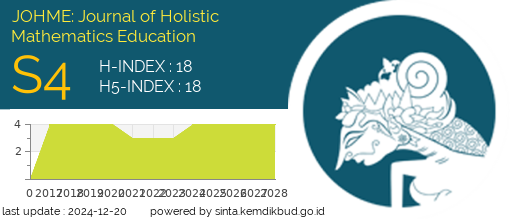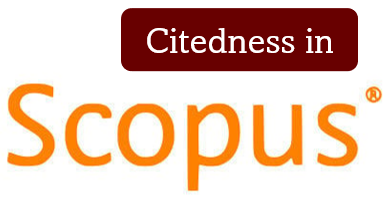PENERAPAN DISIPLIN POSITIF DALAM PEMBELAJARAN DITINJAU MELALUI PERSPEKTIF KRISTEN [POSITIVE DISCIPLINE IN LEARNING REVIEWED THROUGH A CHRISTIAN PERSPECTIVE]
DOI:
https://doi.org/10.19166/johme.v3i2.2101Keywords:
discipline, indiscipline, positive discipline, Holy Spirit, disiplin, ketidakdisiplinan, disiplin positif, Roh KudusAbstract
Discipline is still a problem in the world of education. In addition, disciplinary enforcement still uses punishment. This deviant behavior of students is a result of humanity's fall into sin. Sin turns people away from God and they choose to become God's rebels. Therefore, humans become more likely to disobey. Having good discipline is the expectation that every teacher wants for their students. However, the teacher prefers to make his students obedient to him but it is not always accompanied by a growing awareness to be disciplined in the hearts of students. One form of application that encourages discipline with compliance is positive discipline. The author wants to analyze the application of positive discipline through a Christian perspective. Positive discipline is a disciplined approach based on trust between teachers and students. The analysis shows that the application of positive discipline in accordance with Christian principles has not been able to stop indiscipline. This is evident from the responses of students who are still repeating their actions even though positive discipline has been applied in learning. One of the forms of applying positive discipline that is in line with Christianity's view is one of the results of awareness and changes in student attitudes not because of dialogue but because of the touch of the Holy Spirit. In its application, it must always rely on the intervention of the Holy Spirit.
BAHASA INDONESIA ABSTRACT: Ketidakdisiplinan masih menjadi permasalahan di dalam dunia pendidikan. Selain itu penegakkan kedisiplinan masih menggunakan hukuman. Perilaku menyimpang siswa ini merupakan akibat dari kejatuhan manusia ke dalam dosa. Dosa membuat manusia menjadi berpaling dan memilih untuk menjadi pemberontak Allah. Oleh sebab itu, manusia menjadi lebih menyukai melakukan ketidaktaatan. Memiliki kedisiplinan yang baik merupakan harapan yang setiap guru inginkan terhadap siswanya. Akan tetapi, guru lebih suka membuat siswanya patuh kepadanya tetapi tidak diiringi dengan menumbuhkan kesadaran untuk berdisiplin dalam hati siswa. Salah satu bentuk penerapan yang mendorong kedisiplinan dengan kepatuhan adalah disiplin positif. Tujuan penelitian ini adalah menganalisis penerapan disiplin positif melalui perspektif Kristen. Disiplin positif merupakan sebuah pendekatan disiplin yang berdasarkan kepada rasa kepercayaan antara guru dan siswa. Hasil analisis menunjukkan penerapan disiplin positif sudah sesuai dengan prinsip kekristenan namun belum dapat menghentikan ketidakdisiplinan. Hal ini terbukti dari respon siswa yang masih mengulangi perbuatannya meskipun telah diterapkan disiplin positif di dalam pembelajaran. Bentuk penerapan disiplin positif yang sesuai dengan pandangan Kekristenan salah satunya adalah hasil dari kesadaran dan perubahan sikap siswa bukan karena adanya dialog tetapi karena jamahan Roh Kudus. Seharusnya dalam penerapannya harus selalu mengandalkan campur tangan Roh Kudus.
References
Ardini, P. P. (2015). “Penerapan hukuman”, bias antara upaya menanamkan disiplin dengan melakukan kekerasan terhadap anak. Jurnal Pendidikan Usia Dini, 9(2), 251-267. Retrieved from http://pps.unj.ac.id/journal/jpud/article/view/103/103
Aulina, C. N. (2013). Penanaman disiplin pada anak usia dini. PEDAGOGIA: Jurnal Pendidikan, 2(1), 36-49. https://doi.org/10.21070/pedagogia.v2i1.45
Aziz, R. U. (2006). Jangan biarkan anak kita berperilaku menyimpang. Solo, Indonesia: Tiga Serangkai.
Bavinck, H., & Bolt, J. (2011). Reformed dogmatics. Grand Rapids, MI: Baker Academic.
Barber, A. (2014). Common threads: Investigating and solving school discipline. Lanham, MD: Rowman & Littlefield Education.
Beazley, H., Bessell, S., Ennew, J., & Waterson, R. (2005). What children say: Results of comparative research on the physical and emotional punishment of children in Southeast Asia and the Pacific. Bangkok, Thailand: Save the Children Sweden Southeast Asia and the Pacific.
Dami, Z. A. (2019). Pedagogi shalom: Analisis kritis terhadap pedagogi kritis Henry A. Giroux dan relevansinya bagi pendidikan Kristen di Indonesia. Jurnal Filsafat, 29(1), 134-165. Retrieved from https://jurnal.ugm.ac.id/wisdom/article/view/42315/23935
Dreikurs, R. M. D., & Soltz, V. R. N. (1992). Children: The challenge. New York, NY: Penguin Group.
Durrant, J. E. (2016). Positive discipline in everyday parenting (4th ed.). Bangkok, Thailand: Save the Children Sweden.
Fiana, F. J., Daharnis, & Ridha, M. (2013). Disiplin siswa di sekolah dan implikasinya dalam pelayanan bimbingan dan konseling. Konselor, 2(3), 26-33. https://doi.org/10.24036/02013231733-0-00
Febriandari, E. I. (2013). Penerapan metode disiplin positif sebagai bentuk pembinaan pendidikan karakter disiplin anak. Karya Ilmiah Dosen, 1(1), 152-169. Retrieved from http://journal.stkippgritrenggalek.ac.id/index.php/kid/article/view/132/82
Frame, J. M. (2002). The doctrine of God. Phillipsburg, NJ: P & R Pub.
Hodge, C. (2015). Systematic theology, Volume 1. Charleston, SC: CreateSpace Independent Publishing Platform.
Hoekema, A. A. (2000). Manusia: Ciptaan menurut gambar Allah. Surabaya, Indonesia: Momentum.
Kagema, N., & Kagoiya, P. (2018). Examining factors contributing to indiscipline in primary schools in Nyeri Central Sub-County, Kenya. Pedagogical Research, 3(2), 1-8. https://doi.org/10.20897/pr/91650
Knight, G. R. (2009). Filsafat dan pendidikan: Sebuah pendahuluan dari perspektif Kristen. Jakarta, Indonesia: Universitas Pelita Harapan Press.
Kuloheri, F. V. (2016). Indiscipline in young EFL learner classes. London, UK: Palgrave Macmillan.
Maharani, L., & Mustika, M. (2016). Hubungan self awareness dengan kedisiplinan peserta didik kelas VIII di SMP Wiyatama Bandar Lampung (Penelitian korelasional bidang Bk pribadi). KONSELI: Jurnal Bimbingan dan Konseling, 3(1), 57-62. Retrieved from http://ejournal.radenintan.ac.id/index.php/konseli/article/view/555/447
Mannan, M. N., Sopyan, A., & Sunarno. (2015). Pengembangan perangkat pembelajaran berbasis kearifan lokal untuk mengembangkan karakter positif siswa SD. Jurnal Inovasi dan Pembelajaran Fisika, 2(2), 141-146. Retrieved from https://ejournal.unsri.ac.id/index.php/jipf/article/view/2615/1363
Mustari, M. (2017). Nilai karakteristik: Refleksi untuk pendidikan. Depok, Indonesia: Rajawali Pers.
Nadeak, E. H., & Hidayat, D. (2017). Karakteristik pendidikan yang menebus di suatu sekolah Kristen [The characteristics of redemptive education in a Christian school]. Polyglot: Jurnal Ilmiah, 13(2), 87-97. https://doi.org/10.19166/pji.v13i2.439
Nelsen, J. W. (1979). The effectiveness of adlerian parent and teacher study groups in changing child maladaptive behavior in a positive direction [Doctoral dissertation, University of San Francisco].
Nelsen, J., & Lott, L. (1997). Positive discipline in the classroom: A step-by-step approach to bring positive discipline to the classroom and to help teachers of all grade levels implement classroom meetings: Activities for teachers and students. Orem, UT: Empowering People.
Nelsen, J., Lott, L., & Glenn, H. S. (2000). Positive discipline in the classroom: Developing mutual respect, cooperation, and responsibility in your classroom. Roseville, CA: Prima.
Nelsen, J., Lott, L., & Glenn, H. S. (2007). Positive discipline A-Z: 1001 solutions to everyday parenting problems. New York, NY: Three Rivers Press.
Nelsen, J., & Lott, L. (2012). Positive discipline for teenagers: Empowering your teens and yourself through kind and firm parenting. New York, NY: Three Rivers Press.
Nelson, J., Erwin, C., & Duffy, R. A. (2015). Positive discipline: The first three years: From infant to toddler laying the foundation for raising a capable, confident child. New York, NY: Harmony Crown.
Ngwokabuenui, P. Y. (2015). Students' indiscipline: Types, causes and possible solutions: The case of secondary schools in Cameroon. Journal of Education and Practice, 6(22), 64-73. Retrieved from https://files.eric.ed.gov/fulltext/EJ1079558.pdf
Platt, A. R. (1979). Efficacy of class meetings in elementary schools [Master's thesis, California State University]. Sacramento.
Pratt, R. L. (2000). Dirancang bagi kemuliaan: Apa yang telah Allah mungkinkan untuk terjadi pada diri kita. Surabaya, Indonesia: Momentum.
Qodar, N. (2015). Survei ICRW: 84% Anak Indonesia alami kekerasan di sekolah. Retrieved from https://www.liputan6.com/news/read/2191106/survei-icrw-84-anak-indonesia-alami-kekerasan-di-sekolah#
Simanjuntak, E. T., Djahi, I. N., Tamba, K. P., Souisa, J. H., Toisuta, W., Dionisio, A. G., & Palekahelu, D. T. (2017). Disiplin positif: Pendekatan menyeluruh handout untuk peserta. Jakarta, Indonesia: Yayasan Nusantara Sejati.
Sutrisno, H. (2009). Kasus perilaku pelanggaran disiplin siswa di sekolah ditinjau dari kerangka teori sosiologi fungsionalisme. Jurnal Pendidikan Inovatif, 4(2), 60-66. Retrieved from https://jurnaljpi.files.wordpress.com/2009/09/vol-4-no-2-heru-sutrisno.pdf
Tan, S. Y. (2011). Counseling and psychotherapy: A Christian perspective. Grand Rapids, MI: Baker Academic.
UNESCO. (2006). Merangkul perbedaan: Perangkat untuk mengembangkan lingkungan inklusif ramah terhadap pembelajaran buku khusus 1: Disiplin positif dalam kelas inklusif ramah pembelajaran: Panduan bagi pendidik. Retrieved from https://www.eenet.org.uk/resources/docs/ilfe/indonesia/LIRP_sp_1.pdf
Utari, N. D., Ulfah, M., & Warneri. (2019). Analisis faktor penyebab ketidakdisiplinan siswa di SMA Santun Untan Pontianak. Jurnal Pendidikan dan Pembelajaran Khatulistiwa, 8(3), 1-10. Retrieved from http://jurnal.untan.ac.id/index.php/jpdpb/article/view/31750/75676580406
Van Brummelen, H. (2009). Berjalan dengan Tuhan di dalam kelas: Pendekatan Kristiani untuk pembelajaran. Tangerang, Indonesia: Universitas Pelita Harapan Press.
Van Dyk, J. (2013). Surat-surat untuk Lisa: Percakapan dengan seorang guru Kristen. Tangerang, Indonesia: UPH Press.
Wagiu, E. M., & Hidayat, D. (2019). Penerapan imbalan dan konsekuensi berbasis demokrasi dalam upaya meningkatkan kedisiplinan siswa kelas 3 sekolah dasar Kupang [The implementation of democratic-based rewards and consequences to improve discipline of grade 3 elementary school students in Kupang]. Polyglot: Jurnal Ilmiah, 15(1), 156-168. https://doi.org/10.19166/pji.v15i1.933
Way, S. M. (2011). School discipline and disruptive classroom behavior: The moderating effects of student perceptions. The Sociological Quarterly, 52(3), 346-375. https://doi.org/10.1111/j.1533-8525.2011.01210.xDownloads
Published
How to Cite
Issue
Section
License
Authors who publish with this journal agree to the following terms:
1) Authors retain copyright and grant the journal right of first publication with the work simultaneously licensed under a Creative Commons Attribution License (CC-BY-SA 4.0) that allows others to share the work with an acknowledgement of the work's authorship and initial publication in this journal.
2) Authors are able to enter into separate, additional contractual arrangements for the non-exclusive distribution of the journal's published version of the work (e.g., post it to an institutional repository or publish it in a book), with an acknowledgement of its initial publication in this journal.
3) Authors are permitted and encouraged to post their work online (e.g., in institutional repositories or on their website). The final published PDF should be used and bibliographic details that credit the publication in this journal should be included.”










